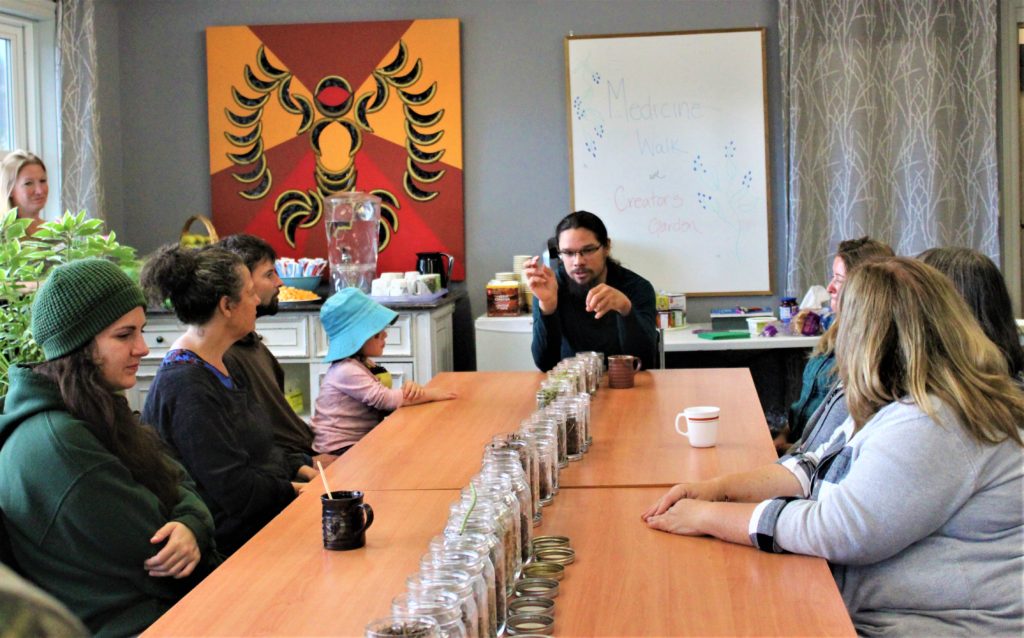Medicine Walk reveals the healing power of plants

Sept. 17, 2019
By Nate Smelle
On Saturday, Sept. 14 educators from the Algonquin Inodewiziwin EarlyON Centre hosted a Medicine Walk with Joe Pitawanakwat of Creator's Garden in Peterborough. Throughout the full-day workshop, Pitawanakwat shared knowledge regarding a wide range of plants growing throughout North Hastings and the Great Lakes region.
As a child Pitawanakwat said he spent a lot of time alone in nature, exploring the trails behind his home on the Wikiwemikong First Nation on Manitoulin Island. Although he grew up immersed in a landscape full of plants, he said it was his wife Kristy that sparked his passion for the healing potential of plant-based medicines when she gave him a book on edible and medicinal plants while he was studying in the classical guitar program at Cambrian College.
Immediately feeling called to devote his time and energy to expand his knowledge of plant-based medicines, by the end of the school year Pitawanakwat had decided to leave college so he could focus his attention on plants. He said the decision to leave school was made easier by the fact nearly all the medicine knowledge holders for the Wikiwemikong First Nation died that same year. Luckily, one of the surviving keepers of this knowledge was his Grandmother Thecla Pheasant.
“There was one fateful year where we just lost a whole bunch of people,” Pitawanakwat said.
“One of the last medicine knowledge holders was my Grandma, so we started spending more time with her. Then I was able to really start learning about plant medicine.”
Pitawanakwat is very grateful for the knowledge his Grandmother shared with him, and the opportunity she gave him to carry on their family and community's tradition. He noted that most of the teachings his Grandmother passed on to him were given to her in a similar manner by her mother and his great-Grandmother Bridget, a midwife and medicine women. When people pay attention to nature and everything the plants are saying, Pitawanakwat said it is easy to figure out what medicinal purposes a plant can be used for. Ideally it is best to look at a plant in as many ways as possible, he said.
“The more you look at a plant, the more obvious its use becomes. You can look at its history of use and how it has been used over the past 10,000 years or so. You can look at all the research that has been done on it to figure out its chemistry. The more ways you look at it the more obvious it will become.”
Understanding how much potential there is for plant-based medicines to improve the quality of people's lives, motivates Pitawanakwat to share what he has learned with others. Oftentimes, he said people falsely believe that access to such medicines is “super-complicated.” This is a misunderstanding Pitawanakwat strives to dispel.
“I want people to see how accessible and how easy it [plant-based medicine] is,” he said.
“Everything that we get in the hospital, from the doctor, or at a pharmacy comes from this source – plants. We are at this really unique time right now with the recognition of Indigenous knowledge where we all can have access to the source and just go right to where it all comes from. When we do that we are going to be able to achieve a better life here.”
Describing the Great Lakes region as a “beacon of plant-based medicine” Pitawanakwat added “The times when we feel the most alive are when we are going back here. The idea here is that when it comes to sickness or injury, when we get the knowledge we need to go back to Ontario, we are going to achieve a better life. Especially if we get all our food from here. The more often we get the knowledge we need to live here, the better life we are going to have … the more blackberries we are going to eat.”
While walking the Heritage Trail with the group before lunch, Pitawanakwat explained how some of this medicinal plants lining the path could be used to treat everything from a headache to a heart condition. He also pointed out plants that could be used to help heal people with mental health issues, digestive problems, low bone density, and a variety of other conditions. One of the things that makes the study of Indigenous plant-based medicines so interesting and exciting to Pitawanakwat is that it is not shackled or limited by a need to generate profits for shareholders.
“We are able to do things that the system hasn't been able to do, because the system relies on profit and the system relies on business,” explained Pitawanakwat.
“So, somebody who is subjected to business is not able to make a lung medicine or a sciatica medicine because it costs too much. When there is no profit they won't do it. But, when you go right to the source you still can clean lungs, you can remove sciatica and you can do all this great stuff.”
|
